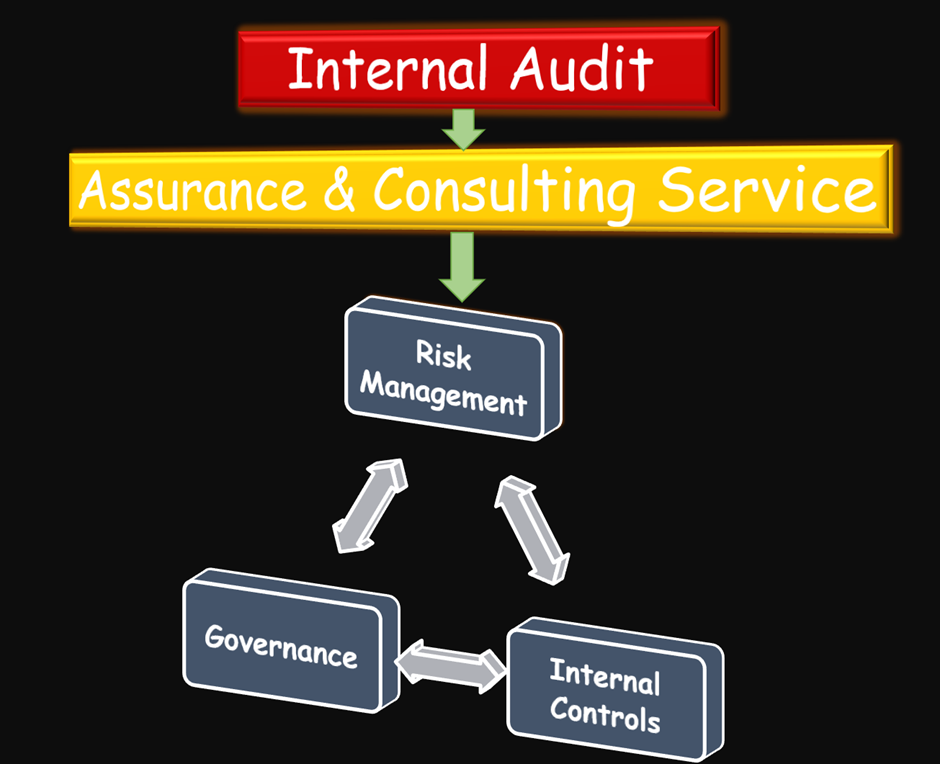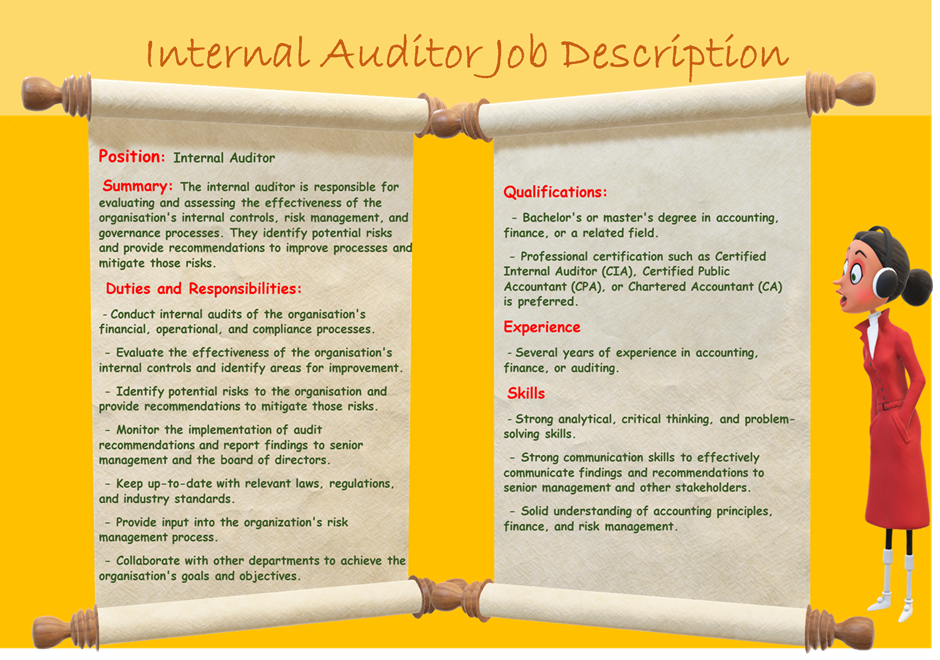Internal Auditor Job Description and Profile
Who are Internal Auditors?
Internal auditors examine the company’s financial statements, operations, and business processes. They are entrusted with this responsibility. Their job is sometimes viewed as a source of discontent in the corporate world. Yet, in reality, they are the Batman of the boardroom. They rise to save the day when things go wrong. They defend the organisation against fraud, corruption, and other nefarious activities. The Institute of Internal Auditors (IIA) defines internal auditing as follows:
Internal auditing is an independent, objective, assurance and consulting activity. It is designed to add value and improve an organisation’s operations. It helps an organisation accomplish its objectives by bringing a systematic, disciplined approach to evaluate and improve the effectiveness of risk management, control, and governance processes.”.
What Does an Internal Auditor Do?
Internal auditors are considered the third line of defence for the organisation. They protect businesses from internal and external risks. They raise red flags in appropriate forums and take adequate actions to keep risks within an acceptable level. Internal auditors report to the Board Audit Committee. They use a systematic process that includes the following steps:
- Audit Planning. The tasks include issuing the engagement letter, preparing a Risk and Control Matrix (RCM), and auditing the programme. They also include creating a list of information and scheduling the meetings.
- Fieldwork. Fieldwork is completing the audit programme. It involves gathering, reviewing, evaluating, and documenting information to reach conclusions.
- Reporting. It involves issuing an audit findings memorandum. Then, conduct an audit closing meeting. Finally, issuing the draft and final audit reports.
- Follow-up. Follow-up is the process of checking with the auditee the status of the agreed action plan. The timing for each audit’s follow-up is decided upon the audit’s closing.
- Additionally, the internal auditor will also complete the audit committee’s document process. They will present periodic reports on audit findings and the progress of the audit plan.
Photo by Marten Bjork on Unsplash
How has the internal auditor role evolved?
The role of the internal auditor has evolved over the years. It used to focus only on compliance. Now it is also a strategic business partner that helps organisations achieve their goals and objectives.
The Institute of Internal Auditors (IIA) is a global body that governs the internal audit profession. In 1941, in North America, the IIA was founded. And it now has a presence with 200 chapters in more than 170 countries.
Historically, internal auditors were watchdogs. They were in charge of making sure the company conformed with all applicable internal policies, rules, and laws. In the 1990s, with the emergence of new rules and technologies, there was a shift in the internal auditor’s job role to that of a more proactive approach. The IIA initially introduced the standards. They are the International Standards for the Professional Practice of Internal Auditing. They guide the conduct of internal audits and the management of internal audit functions. Internal auditors began to focus more on risk management. They identified potential risks to the organisation. Then, they developed strategies to mitigate those risks.
In the early 2000s, internal auditors began to work closely with senior management. They aimed to identify key business risks and provide recommendations for managing those risks. They also focused on value-added activities, such as process improvement and operational efficiency.
Today, the internal auditor role has evolved even further. Internal auditors are now seen as trusted advisors to the organisation. They provide insights and recommendations to senior management. They cover a wide range of strategic, operational, and financial issues. They are also involved in various activities. These include corporate governance, ethics, and sustainability.
Photo by Luis Villasmil on Unsplash
How Do You Become an Internal Auditor?
To become an internal auditor, you must obtain relevant education and professional certifications. You may start as a company trainee or intern to gain auditing experience and develop your technical and soft skills to excel. Networking is essential in any industry. This includes attending industry events. Also, join professional associations and connect with other professionals in the field.
Once you have the necessary education, experience, certification, and skills, you should apply for internal auditor positions. You can find job openings on online job boards, company websites, or through professional associations. Tailor your resume and cover letter to the job requirements and highlight your relevant experience and skills.
Internal Auditor Skills and Qualifications
Internal auditors check and assess an organisation’s internal controls. They also test risk management and governance processes. Their profile requires a combination of education, experience, skills, knowledge, and attitude. This will help them carry out their responsibilities effectively. Here is the typical profile of a successful internal auditor:
- Education. Auditors generally hold a bachelor’s or master’s degree in accounting, finance, or a related field. They may also have a professional certification. For example, a Certified Internal Auditor (CIA), a Certified Public Accountant (CPA), or a Chartered Accountant (ACA).
- Experience. Auditors usually have several years of experience in accounting, finance, or auditing. Many successful internal auditors come from a Big Four background.
- Knowledge. Auditors need to have a solid understanding of accounting principles, finance, and risk management. They must also know relevant laws, regulations, and industry standards.
- Skills. Auditors need strong analytical, critical thinking, and problem-solving skills to evaluate an organisation’s internal controls, identify potential risks, and recommend solutions. They also need strong communication skills. They use these skills to communicate findings and recommendations effectively to senior management and other stakeholders.
- Attitude. Auditors must follow a Professional Code of Ethics, which requires them to comply with “Integrity, Objectivity, Confidentiality, and Competency.”. They should have a curious mindset. They should always seek to understand how the organisation operates and where potential risks may lie.
- Professional Development. Internal auditing is a continuously evolving field. Staying up-to-date with industry developments, regulations, and best practices is essential. Auditors need to attend conferences, take training courses, and stay informed about new trends in the field.
Internal Auditor Job Description
An organisation can modify the job description of an internal auditor to meet their needs and the position’s specifications. Here is an example of an internal auditor’s job description:
What Are the Elements of Modern Internal Audit Methodology?
Modern internal audit methodology has evolved. It has kept pace with the changing business environment. It has also adapted to the increasing complexity of organisations. It involves a risk-based approach. It focuses on identifying and assessing risks to the organisation. It assures effective risk management. As a result, auditors develop their annual internal audit plan based on the level of risk to the organisation. They don’t conduct audits randomly or periodically.
Auditors are adopting agile methodology. Agile emphasizes collaboration, flexibility, and continuous improvement. This helps auditors adapt to changing circumstances. It also helps them deliver value-added insights and recommendations to the organization. Additionally, auditors are working closely with other assurance providers. These include compliance, IT security, and risk management. They aim to provide integrated assurance to the organisation.
Auditors also use data analytics to spot anomalies, trends, and patterns in large volumes of data. This helps identify potential risks and areas for improvement.
What Is the Future of the Internal Auditor Role?
The scope of the internal audit role has significantly evolved over the past several decades. It will continue to change with new challenges and opportunities. Auditors have a traditional role. They also increasingly provide assurance and advisory services in other areas. These areas include cybersecurity, sustainability, and culture. The future of the internal audit job role looks promising. Yet, internal auditors will need to adapt and develop new skills. They need to meet changing priorities for organisations.
Learn More About a Career as an Internal Auditor. This guide covers how to become an internal auditor. It includes qualifications, skills, and requirements. It also includes a CV template with examples and salary information.
Search Jobs to find out about the internal auditor job roles we currently have available.
Job Seekers
On the hunt for your next role? Upload your CV below and we’ll be in touch to discuss your requirements.
Employers
For employers seeking the right skills and cultural fit for your business, send us your vacancy to find out more about how we can help.
Submit CV Send Us Your VacancySearch Jobs
Popular this week
- What Qualifications And Skills Are Needed To Be An Accountant?
- How Does Industry 4.0 Differ From The Previous Generation?
- Agile For Accountants: Six Steps To Provide Necessary Tools And Relevant Processes
- What Are The Main Differences Between ACA and ACCA?
- What Are The Top Five Financial Accounting Facts For #AccountantsDay



